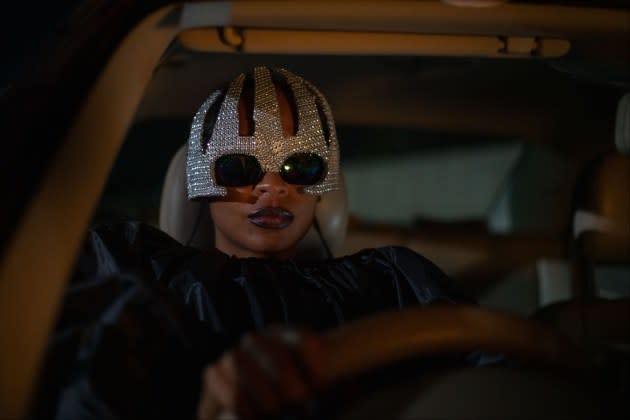‘On Becoming a Guinea Fowl’ Review: Trauma Takes on Grieving in Rungano Nyoni’s Darkly Transfixing Second Feature
- Oops!Something went wrong.Please try again later.

It is polite, we are told, not to speak ill of the dead, though it’s just as often prudent not to speak ill of the living. For victims with grievances against those older and more powerful than them, it’s hard to know when to speak up at all. But a quivering collective fury scalds through the silence in Rungano Nyoni’s tremendous new film “On Becoming a Guinea Fowl” — as a group of young women, nursing the scars of sexual abuse, chafe against the quiet complicity of family elders when their shared perpetrator drops suddenly and none-too-sadly dead. Blending molasses-dark comedy with searing poetic realism to capture contemporary Zambian society at a generational impasse between staunch tradition and social progress, this is palpably new, future-minded filmmaking, at once intrepidly daring and rigorously poised.
Unspooling in Cannes’ Un Certain Regard sidebar — though more worthy of a spot in the main Competition, the section Nyoni served as a juror last year — “On Becoming a Guinea Fowl” arrives in Cannes with an enviable pedigree, backed by A24, BBC Film and high-flying Irish outfit Element Pictures (“Poor Things,” “Room”). That’s a testament to the impact of Nyoni’s 2017 debut “I Am Not a Witch,” which likewise mixed folkloric surrealism and arthouse austerity in a study of African womanhood imperiled by social conservatism. That was a more flamboyantly experimental film than this one, awash with arrestingly strange imagery and sonic landscaping that foregrounded the disparate influences of a filmmaker born in Zambia and predominantly raised in Wales.
More from Variety
Her follow-up pares back the formal fireworks, probing deeper into character and community to extract tangled cultural conflicts — though she can still, in collaboration with ace Colombian DP David Gallego (“Embrace of the Serpent,” “War Pony”), compose a frame like nobody’s business. “Guinea Fowl” opens on an image of stark absurdity, introducing Shula (Susan Chardy) as she drives serenely home from a fancy-dress party, dressed in a black puffa bodysuit of vast, balloon-like proportions, a ornate diamanté headdress concealing her expression from us. It’s hard to tell if the inspiration behind the costume is hip-hop royalty, the native bird of the title, or somewhere in between: Newly resettled in Zambia after a period abroad, Shula (also the name of the persecuted young protagonist in “I Am Not a Witch,” perhaps a spiritual relative) complies with no cultural marker.
Something in the road gives her pause — enough to make her stop the car, but not exit it. Dispassionately, she calls her father (Henry B.J. Phiri) to inform him that Uncle Fred is lying dead on the asphalt, her voice crisp and matter-of-fact, her face stoically still. As the news ripples through the family in the early hours, she remains parked by the body, not moving even when her more excitable cousin Nsansa (a riotous Elizabeth Chisela) knocks on the car door, gleefully bearing the detail that their uncle has died a few feet from a brothel. “The big man has died a happy man,” Nsansa cackles, as vocally unfazed by this death in the family as Shula is tersely so. As the two young women keep a kind of vigil over the corpse, their motivation for doing so seems ever less protective. Perhaps they simply wish to make sure he’s dead.
That Shula, Nsansa and a third cousin, Bupe (Esther Singini), have all been sexually assaulted by Uncle Fred — among an untold number of other women in the family — is made clear early on, without it ever being an explicit point of conversation, much less of revelation. Chardy’s performance, still but never impassive, is marked by any number of itchy sore points that Shula is wearily at pains not to scratch. But this is not a story of dark family secrets coming home to roost, not least because everyone has always known the truth. It’s just that no one agrees on what to do with it.
Shula is loath to feign grief and pay her respects as the rituals of a traditional funeral are set in motion. Legions of distant relatives descend upon her middle-class family home to cook, sleep, sew blood-red funeral robes and wail en masse — a shrill human symphony made all the more agitating against the droning minimalism of Olivier Dandré’s remarkable sound design — while Fred’s reputation is given a retrospective glow-up by all. Her mother and aunts advise burying pain with the men behind it, as all their mistreated foremothers did before them. There’s even less collective compassion for Fred’s young widow — devastatingly etched, in a few short, crumpled scenes, by Norah Mwansa — who’s not even tacitly treated as a victim, but a parasite on their familial legacy. As for what the men think, Nyoni doesn’t much care: Male voices here are heard only asking for money and food, pitiful dependants somehow granted premier social status.
The female voice, however, is made elastic and impassioned, rising in unison to contrasting ends. At the film’s climax, the insistent laments of unquestioning mourners can only be countered by a protesting chorus of young women mimicking bird calls, emulating the guinea fowl’s own warning cry against predators, ultimately swelling to the tenor of a security alarm. When they speak individually, meanwhile, they can speak for others too: In one stunning set piece, Bupe’s smartphone-shot abuse testimony is wrested and renarrated by Shula before returning to its original teller, the victims’ testimonies firmly unified by this alternation. No generation wins the standoff in “On Becoming a Guinea Fowl,” but Nyoni’s mordant, shattering film suggests defiant memory will outlive denial.
Best of Variety
Sign up for Variety’s Newsletter. For the latest news, follow us on Facebook, Twitter, and Instagram.
